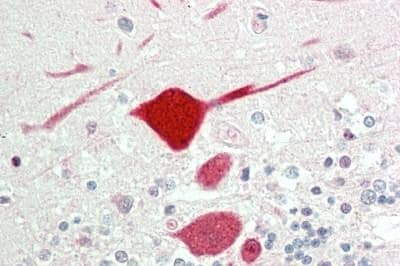Anti-KCNC1 antibody (ab230686)
Key features and details
- Rabbit polyclonal to KCNC1
- Suitable for: WB, IHC-P
- Reacts with: Rat, Human
- Isotype: IgG
Overview
-
Product name
Anti-KCNC1 antibody
See all KCNC1 primary antibodies -
Description
Rabbit polyclonal to KCNC1 -
Host species
Rabbit -
Tested applications
Suitable for: WB, IHC-Pmore details -
Species reactivity
Reacts with: Rat, Human
Predicted to work with: Mouse, Rabbit, Cow
-
Immunogen
Synthetic peptide corresponding to Human KCNC1 (internal sequence) conjugated to keyhole limpet haemocyanin.
Database link: P48547 -
Positive control
- WB: HepG2 whole cell lysate; rat brain whole cell lysate. IHC-P: Human cerebellum tissue.
-
General notes
The Life Science industry has been in the grips of a reproducibility crisis for a number of years. Abcam is leading the way in addressing this with our range of recombinant monoclonal antibodies and knockout edited cell lines for gold-standard validation. Please check that this product meets your needs before purchasing.
If you have any questions, special requirements or concerns, please send us an inquiry and/or contact our Support team ahead of purchase. Recommended alternatives for this product can be found below, along with publications, customer reviews and Q&As
Properties
-
Form
Liquid -
Storage instructions
Shipped at 4°C. Store at +4°C short term (1-2 weeks). Upon delivery aliquot. Store at -20°C long term. Avoid freeze / thaw cycle. -
Storage buffer
pH: 7.30
Preservative: 0.01% Sodium azide
Constituents: PBS, 30% Glycerol (glycerin, glycerine) -
 Concentration information loading...
Concentration information loading... -
Purity
Immunogen affinity purified -
Clonality
Polyclonal -
Isotype
IgG -
Research areas
Images
-
All lanes : Anti-KCNC1 antibody (ab230686) at 1/500 dilution
Lane 1 : HepG2 (human liver hepatocellular carcinoma cell line) whole cell lysate
Lane 2 : Rat brain whole cell lysate
Developed using the ECL technique.
Predicted band size: 58 kDa
-
 Immunohistochemistry (Formalin/PFA-fixed paraffin-embedded sections) - Anti-KCNC1 antibody (ab230686)
Immunohistochemistry (Formalin/PFA-fixed paraffin-embedded sections) - Anti-KCNC1 antibody (ab230686)Formalin-fixed, paraffin-embedded human cerebellum tissue stained for KCNC1 with ab230686 at 1/100 dilution in immunohistochemical analysis.









